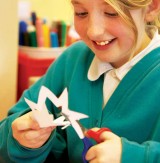Gareth Pimley looks at how the Cambridge Primary Review can help schools to improve standards and make crucial decisions...
The Cambridge Primary Review (CPR) final report is, in my opinion, the most important and useful report about primary education to have emerged in over 40 years, and I would urge every primary school in England to buy a copy. Why? In short, the words of wisdom within it have the potential to empower every primary teacher and headteacher in the country to improve the quality of teaching and learning in our schools.
It is packed with research-based evidence and recommendations on many aspects of primary education – evidence that can directly inform the decisions you make in your classroom or school, including crucial decisions about what the curriculum looks like, how standards can be improved and how children can become more motivated and engaged in their learning.
Quite often, evidence in the report will back up what your professional experience and judgement is telling you. By confirming what you believe to be the case, it can give you the confidence to take a leap of faith where you might otherwise be reluctant to do so. However, where the report really comes into its own is in challenging official orthodoxies and widely held beliefs that can act as a barrier to teaching and learning.
Join the network
The Cambridge Primary Review has set up a rapidly growing national network to support children, teachers and others working in primary education by encouraging, disseminating and celebrating practice that is grounded in evidence and promotes professional autonomy. Everyone working in primary education is very welcome to join. If you would like to join the network please visit primaryreview.org.uk
Children, their World, their Education: Final report and recommendations of the Cambridge Primary Review, edited by Robin Alexander, is available from routledge.com
Frequently asked questions
The CPR final report is a weighty document and it takes some time to become familiar with its main themes and ideas. For the busy classroom teacher or headteacher there is a very readable introduction to the report available for download (primaryreview.org.uk). To give you a feeling for how it might be used, I have picked out three questions schools often ask that can be addressed by delving into the report.
The curriculum in my school is unmanageable. How can I fit it all in?
 What the evidence says
What the evidence says
If you are finding it impossible to cover everything that is required, you are certainly not alone! CPR evidence reveals that “the most frequent charge laid by our witnesses against the current National Curriculum was that it is overcrowded” (p.213). So what is causing this?
According to the CPR, there is too much content in the current National Curriculum. However, in very many schools there is an even bigger issue: the timetable and resources are skewed in favour of the ‘basic’ subjects because of the pressure of inspection and testing. An excessive emphasis on the discrete teaching of literacy and maths has had a significant squeezing effect on the rest of the curriculum. In fact, we can be sure that overcrowding is not just a consequence of there being too much curriculum content because there is clear evidence from the Review that some schools do successfully manage to fit the entire National Curriculum into the time available.
A way forward
One way forward is to consider how these schools manage to achieve this seemingly impossible feat. The role of the headteacher is absolutely critical here. He or she needs to have the independence of mind and courage to promote a more imaginative and intelligent approach to curriculum planning and timetabling so that a disproportionate amount of time is not allocated to teaching literacy and mathematics.
If you cannot imagine this happening in your school, do not despair. The evidence suggests that as a class teacher you can still significantly reduce the problem of curriculum overcrowding by finding ways to develop your expertise in those subjects where you feel less confident. At the very least you need to have a grasp of what each of the units of work you are teaching are getting at in terms of children’s learning. This will enable you to strip out any superfluous activities and focus on what is important and achievable within the time and resources available.
For example, in design and technology, knowing that the much maligned Slippers unit is fundamentally about designing and making a usable, purposeful product from a combination of fabric shapes means that you are more able to take control of it, remove anything extraneous and perhaps even change the context to designing and making bags, hats or even waistcoats. If your confidence needs boosting in a non-core subject, seek help from your subject leader. Failing that, see if neighbouring schools can offer the expertise you need or contact your local authority or the relevant subject association.
Our school has a skills-based curriculum, but the Government say that knowledge is more important. Who’s right?
What the evidence says
The evidence suggests that we are in quite a muddle about both ‘knowledge’ and ‘skills’. The trend in many primary schools is to view knowledge narrowly and negatively and whilst skills are often looked on far more favourably, the term is used to cover a wider range of types of learning than it should. As far as knowledge is concerned “the most serious problem is the equating of knowledge with facts or information” such as “the learning of dates” (p.247). But the CPR points out that knowledge is a much broader concept than this, including understanding, explaining and making sense of the world. By comparison, the Review finds that the term skill is sometimes used in an overblown way to mean knowledge, understanding and skills, or key skills, or thinking skills, or any combination of these. The recommendation from the CPR is that we restrict its use to mean the ability to do something that can be improved by practice. In short, both knowledge and skills are vital to children’s learning and we need to be clear about the contribution of each.
A way forward
The overall message from the CPR is that it would be a mistake to follow either an exclusively skillsbased or knowledge-based approach to planning, teaching and learning. This is something worth bearing in mind when your school is reviewing and revising its overall curriculum map. For example, design and technology is often perceived as a skills-led subject, with a focus on designing skills and making skills. In reality, the ability to design and make needs to be fuelled by some fairly hefty chunks of knowledge and understanding. Sometimes this comes from other subjects such as maths (e.g. shape and space) or science (e.g. properties of materials), but there is also some knowledge and understanding that is unique to D&T, such as how mechanisms produce different types of movement (e.g. how wheels and axles work in a toy vehicle).
Our standards in English and maths are not improving in spite of the time and effort we are putting into these subjects. What can we do to improve children’s achievement?
What the evidence says
Drawing on successive reports from HMI and Ofsted, the CPR found schools that were most successful in the KS2 English and maths tests were often those that also delivered a balanced, broadly-based and well-managed curriculum. Put succinctly, “The evidence could not be clearer. If breadth is attained, so are standards. If breadth is sacrificed, so are standards.” (p. 215). Attaining curriculum breadth, says the CPR, is absolutely fundamental to raising standards in English and maths. This relationship could be due to a number of factors, but is attributed by the Review to the role of the broader curriculum in providing meaningful contexts for developing and applying learning.
A way forward
Paradoxically, to raise children’s achievement in English and maths we therefore need to look closely at the rest of the curriculum. According to the evidence, there is a strong relationship between high standards in the basics and good quality teaching in all the remaining subjects. The first step is to ask whether the curriculum in your school is genuinely broad and balanced or if it could do with an injection of CPD and resources to bring the teaching of the non-core subjects up to scratch. The next step is to maximise links between English, maths and other subjects in a more systematic way through long and medium-term planning. Of course, this doesn’t mean that you should stop teaching English and maths rigorously and discretely. But too great an emphasis on the discrete teaching of English and maths – too much of the same approach – can create an artificial ceiling on children’s progress and attainment. Developing and applying English and maths through other subjects helps to fully engage all children in their learning. A good example of this is design and technology, which most children say they enjoy and which teachers say provides a motivating and relevant context for teaching a range of types of non-fiction writing, together with numerous opportunities to develop maths understanding of measures, shape and space and data handling.
What the Cambridge Primary Curriculum has to say on…
...The curriculum
“Children have a right to a curriculum which is well taught regardless of the perceived significance of its various elements or the amount of time devoted to them.”
...School leadership
“Heads should not be distracted from the job for which they are most needed – leading learning.”
...Teaching
“Work towards a pedagogy of repertoire rather than recipe, and principle rather than prescription.”
 The Design and Technology Association is the recognised subject association for D&T. Its aim is to inspire, develop and support excellence in design and technology education for all. For its primary members it is an excellent source of low-cost regular CPD through a range of services including downloadable ready-made teaching resources, a termly specialist magazine featuring new units of work, conferences and events and individual phone and email advice. For further details visit data.org.uk email .(JavaScript must be enabled to view this email address) or call 01789 470007.
The Design and Technology Association is the recognised subject association for D&T. Its aim is to inspire, develop and support excellence in design and technology education for all. For its primary members it is an excellent source of low-cost regular CPD through a range of services including downloadable ready-made teaching resources, a termly specialist magazine featuring new units of work, conferences and events and individual phone and email advice. For further details visit data.org.uk email .(JavaScript must be enabled to view this email address) or call 01789 470007.
 Would you like Gareth Pimley to support your school?
Would you like Gareth Pimley to support your school?
Building on his experience of teaching in primary schools and 18 years with Shropshire Advisory Service, Gareth Pimley will be working in a freelance capacity as a primary education consultant from 1st May. In this new role Gareth will be providing advice, support and CPD in design and technology and whole curriculum development to schools, LAs, companies and other organisations. Gareth has a national reputation for his work in D&T, having previously been seconded to the Design and Technology Association as Assistant Chief Executive. He is also committed to using research-based evidence to help schools improve their whole curriculum planning.
If you are interested in Gareth providing support for your school in design and technology or whole curriculum development, please contact him on 01939 291103 or 07790015871 or email .(JavaScript must be enabled to view this email address)
Use the bottle-flipping craze to create good school behaviour, not bad
Behaviour Management
Behaviour management: choosing the right words
Behaviour Management
Top tips for differentiation
Ace-Maths
Teaching Mandarin via video conference
Languages
